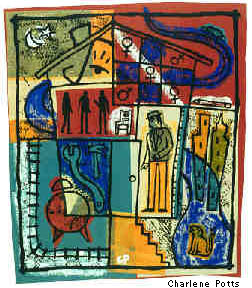
College houses offer unique opportunities for students.
By Myra Lotto
LAST YEAR, when sophomore math major Laura Kornstein finally got tired of answering calculus questions at 2 a.m., she went to the house master of her dormitory and asked him what she could do to fix the situation. With a little administrative magic, the math department agreed to pay Laura for holding weekly math-advising sessions in residence.
The following summer, Laura scaled up the project, and
now half of all students in residence have access to a
residentially-based math advising system. In Spring 1997, without
residentially-based math advising, math advisers had a total of 681
visits. One semester later, with residential math advisers in place,
2,590 visits were recorded.
When Raj Iyer, a junior in the College of Arts and Sciences and
the School of Engineering and Applied Science, felt that student
researchers needed a place to meet and share interests, he turned to
Penn’s residential system to house young researchers together. Now in
its second year of operation, the Effect Project is a self-sufficient,
student-organized, residentially- based program, one that has awarded a
number of grants to students who are conducting research during their
undergraduate careers.
Students like Raj and Laura are remarkable people, but they are
not uncommon. What sets Raj and Laura apart is that they knew how to
take action to make their vision reality. They walked straight into
college houses, and the connections they established there were
invaluable.
Currently, Penn’s residential options include six
fully-functional college-house communities that offer
residentially-based academic support, a wide range of programming in
residence, residential faculty, and full-time graduate fellows in
residence. And by next fall, every undergraduate living on campus will
be a member of one of 12 college houses. Using the structure of the six
existing college houses, the University will create six new communities
within Penn’s other residences [“Gazetteer,” November 1997].
Since the announcement of the plan in September, some have questioned the impact of a shift to community living. [See, for example, “Notes From the Undergrad,” December 1997 — Ed.]
The supposition that collegiate communities would have little or no
impact on the lives of undergraduates raises many interesting points —
but these points can only be speculation. Next year will be my fourth
living in a college house. I’ve already seen what they can accomplish
and bring to students in residence.
Not all learning takes place within the classroom walls.
Somewhere between the educational and research components of our
University, Penn students have the opportunity to learn leadership,
productivity, ambition, and passion for their work.
Combining the theory of a liberal-arts curriculum with the
real-world practicality of a pre-professional education, Penn students
graduate with a grip on the future — a sense of motivation that is true
to our split-personality university. We have some terrific students who
are preparing to inherit the keys to the world, but what forums exist
for students who want to start using their skills right now? We have
tests and papers to exercise our minds, to help us flex our academic
skills, but what do we have to show for lessons learned outside of the
classroom?
Many students don’t know what they’re capable of until they’re
given the opportunity to exercise their motivation. Some are lucky
enough to edit The Daily Pennsylvanian. Others are elected to head the University Assembly. But what about those who don’t want to write a hot expose for the DP or climb the ranks of student government? What avenue is left for them?
With the expansion of the college house system to include all
residences at Penn, every student in residence will be presented with
the opportunity they need to complement their motivation. Establishing
collegiate communities will not eliminate the impersonal apartment-style
living that some feel is vital to Penn culture. Instead, these
communities will offer to all students the resources that Laura and Raj
had at their disposal.
There is no reason the resources and benefits of residential
faculty, residentially-based academic programming, and community living
should be withheld from the majority of Penn undergraduates. Collegiate
communities don’t demand participation. They simply present a course of
action for those looking to get things done.
Myra Lotto is a junior English (non-fiction writing) major from New York City. She is a resident of Van Pelt College House and coordinator of electronic writing advising at Penn.




